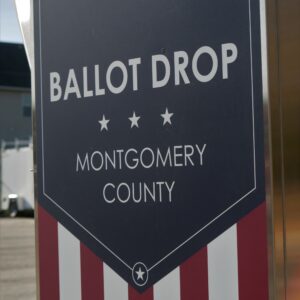In a recent podcast interview, Montgomery County Commissioner Neil Makhija, who chairs the county Election Board, discussed participating in a voting roundtable hosted by Vice President Kamala Harris.
Harris said the federal government is going to make it easier to register to vote. One change is to hire college students through the work-study program to register voters.
At a “meeting with Voting Rights Leaders to Discuss the Fight for Voting Rights and Other Fundamental Freedoms,” as the White House labeled it, Harris touted the administration’s “work to promote voter participation for students.”
“For example, under the federal work study program, we now allow students to get paid, through federal work-study, to register people and to be nonpartisan poll workers,” Harris said.
The new policy is part of President Joe Biden’s 2021 “Promoting Access to Voting” executive order. On Monday, the Department of Education issued an advisory explaining how federal tax dollars can be used to pay students to register other students to vote. The money will be drawn out of Federal Work Study (FWS) funds.
“Voting is fundamental to our democracy, and our schools and colleges play an important role in helping our students become active participants in our democratic society,” U.S. Secretary of Education Miguel Cardona said in a statement.
Voter turnout in Pennsylvania is up because of voting by mail, said Makhija, a lawyer who taught election law at the University of Pennsylvania.
But “there are a lot of concerns about the right to vote and voter suppression,” said Makhija. A Department of Justice task force will train local election officials in security.
People who interact with the federal government human services, Social Security, and parks will be given material about how to register to vote in their state.
“The final piece that I’m really excited about is they changed the federal work study guidelines so that if you’re a student, and you’re on work study, you will be be able to get paid for working as a poll worker or working in a capacity registering voters. So this is great. Because we want young people to vote and we want young people to participate early,” said Makhija.
“We in Montgomery County are going to take extra steps with our 20 or so colleges to encourage young people and even get paid for it through work study, to participate, to serve as poll workers and to really be part of that bedrock of our Democratic process.”
Some of those students will be getting federal tax dollars to help create even more registered voters in Democrat-dominated towns.
DVJournal asked Makhija about fears that partisan politics may be at play in the bid to pay college students to register voters. DVJournal noted the Swarthmore precinct where the students cast their ballots voted 85 percent for the Democratic presidential candidate in a state that the president carried by 1 percent.
“So, a Democratic White House is going to use taxpayer’s dollars to have college students register voters and work at the polls?” DVJournal asked.
Makhija said it will be “a whole of government process to enfranchise everyone…fighting for voting rights for everyone. We want to make sure that people in nursing homes (and) people with disabilities have a chance to vote by mail. All of these steps we can take to make sure that everyone has a chance to make their voice heard.”
Not everyone thinks paying college kids to register new voters is a good idea.
“While we support involvement in the political process, we do not support taxpayer-funded electioneering. This is another example of Democrats trying to stack the deck because they know they are playing a bad hand,” Pennsylvania House Minority Leader Bryan Cutler (R-Lancaster) said.
“If Democrats, both nationally and in Pennsylvania, stopped obstructing comprehensive election reform changes, they would be encouraging more people to voluntarily participate in the election process rather than improperly expending taxpayer resources to cajole unenthusiastic participants to work for their electoral benefit,” said Cutler.
In nursing homes, residents are vulnerable to voter fraud, such as in an instance where a woman who never voted before suddenly cast a mail-in vote from her Delaware County nursing home. And while many officials like to downplay the possibility of voter fraud, especially with mail-in ballots, a recent Heartland Institute poll showed one in five people who they asked admitted taking part in some variation of mail-in voter fraud.
In Chester County, a group of citizens double-checked the voting rolls, finding a plethora of people who were registered to vote but had moved or given the address of an office building or other improbable location.

